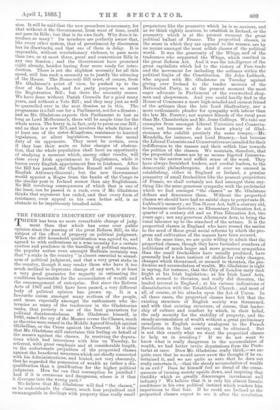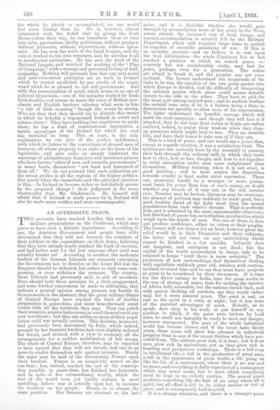THE PREMIER'S INDICTMENT OF PROPERTY. T HERE has been no more
remarkable change of judg- ment than that which has come over public opinion since the passing of the great Reform Bill, on the subject of the effect of property on political judgment. When the £10 household qualification was agreed to, and agreed to with enthusiasm as a wise security for a certain caution and prudence in the handling of political matters, the popular notion even amongst Radicals certainly was that" a stake in the country "is almost essential to sound- ness of political judgment, and that a very great stake in i the country, though it may render those who have t too much inclined to deprecate change of any sort, is at least a very good guarantee for sagacity in estimating the conditions favourable for the accumulation of wealth and the encouragement of enterprise. But since the Reform Acts of 1867 and 1885 have been passed, a very different body of political opinion has grown up. It is a favourite axiom amongst many sections of the people, and more especially amongst the enthusiasts who de- termine so many of the tendencies in the Gladstonian ranks, that poverty is one of the best guarantees for political disinterestedness. Mr. Gladstone himself, in 1886, raised the cry of the Masses verstur the Classes, much as the cries were raised in the Middle Ages of Guelph against Ghibelline, or the Cross against the Crescent. It is clear that Mr. Gladstone still entertains this feeling on behalf of the masses against the classes. In receiving the deputa- tions which had interviews with him on Tuesday, he referred, with great emphasis and at considerable length, to the unfortunate prejudices of the propertied classes against the beneficent measures which are chiefly connected with his Administrations, and hinted, not very obscurely, that he regarded the possession of wealth as rather a dis- qualification than a qualification for the higher political judgment. i t. How far can that assumption be justified ? i And f t s erroneous and dangerous, where is it that it diverges into the wrong path ? We believe that Mr. Gladstone will find "the classes," as he understands the classes, much less prejudiced and unmanageable in dealings with property than really small proprietors like the peasantry which he is so anxious, and as we think rightly anxious, to establish in Ireland, or the peasantry which is at the present moment the great political ballast of France. The propertied classes, in the sense in which they are opposed to the masses, are by no means amongst the most selfish classes of the political world. It was the generosity of the Whigs, and of the tradesmen who supported the Whigs, which resulted in the great Reform Act. And it was the intelligence of the great capitalists which led to the victory of Free-trade and the movement for including the artisans within the political limits of the Constitution. Sir John Lubbock, who argued with Mr. Gladstone on Tuesday against giving over Ireland to the tender mercies of the Nationalist Party, is at the present moment the most eager advocate in Parliament of the overworked shop- men and shopwomen. And you could hardly find in the House of Commons a more high-minded and earnest friend of the artisans than the late Lord Shaftesbury, nor a more enthusiastic pleader for sympathy with labour than the late Mr. Forster; nor warmer friends of the rural poor than Mr. Chamberlain and Mr. Jesse Collings. We take our examples from amongst Liberal Unionists and Conserva- tives, not because we do not know plenty of Glad- stonians who exhibit precisely the same temper,—Mr. Mundella, for instance, and Lord Bra,ssey,—but because the Liberal Unionists and Conservatives are assailed for their indifference to the masses and their selfish bias towards the politics of the classes. We maintain, therefore, that the propertied classes are by no means bigoted Conserva- tives in the narrow and selfish sense of the word. They have always furnished leaders, and cordial leaders, to the democratic philanthropists. And if ever we succeed in establishing, either in England or Ireland, a genuine peasantry of small freeholders like the peasant-proprietors of France, we shall certainly not find amongst them any- thing like the same generous sympathy with the proletariat which we find amongst "the classes" as Mr. Gladstone defines and denounces them. Without the propertied classes we should have had no saints'-days to perpetuate St. Lubbock's memory ; no Ten-Hours Act, half-a-century old, to humanise our factories ; no Elementary Education Act, a quarter of a century old and no Free Education Act, two years ago ; nor any generous Allotments Acts, to bring the rural labourer up to the standard of the artisan. It is the propertied classes in England who have roused the nation to the need of those great social reforms by which the pro, gross and cultivation of the masses have been secured. At the same time, we are quite willing to admit that the propertied classes, though they have furnished numbers of politicians of much larger and more generous sympathies than the small freeholders have usually produced, have generally had a keen instinct of dislike for risky changes, changes which threatened, or seemed to threaten, the pro- duction and accumulation of wealth. Mr. Gladstone is right in saying, for instance, that the City of London early took fright at his Irish legislation; at his Irish Land Acts, which seemed to threaten, and really did threaten, the landed interest in England ; at his various indications of dissatisfaction with the Established Church ; and most of all, of course, at his attacks upon the Act of Union. In all these cases, the propertied classes have felt that the existing structure of English society was threatened, and with that existing structure, of course, that leader- ship of culture and comfort by which, in their belief, the only security for the stability of property, and the steady accumulation of wealth without a great preliminary cataclysm in English society analogous to the French Revolution in the last century, can be obtained. But is not this exactly what we want the propertied classes to help us in avoiding ? If we do not want to know what is really dangerous to the accumulation of wealth, we had better invite deputations from the Prole- tariat at once. Does Mr. Gladstone really think,—we are quite sure that he would never avow the thought if he en- tertained it, and we are quite as sure that he does not really entertain it,—that the steady accumulation of wealth is an evil ? Does he himself feel no dread inspiring the conse- quences of turning society upside down, and tha.t timidity which so greatly discourages investment and industry ? We believe that it is only his almost fanatic confidence in his own political instinct which renders him impervious to that fear. If be could see Ireland as the propertied classes expect to see it after the revolution for which he pleads is accomplished, no one would feel more dismay than he. He is, however, almost infatuated with the belief that by giving the Irish Home-rulers their way, he can transform them at once into calm, passionless, thrifty politicians, without grudges, without jealousies, without superstitions, without ignor- ance. He has seen the work of the Land League, and the ruin it worked to his own measures, and he ascribes it all to misdirected patriotism. He has seen the work of the National League, and watched the working of the "Plan, of Campaign," with a strange and perverted feeling of half- sympathy. Nothing will persuade him that any anti-social and anti-economical principles are at work in Ireland which he cannot annihilate by one stroke of the magic wand which he is pleased to call self government. And with this preoccupation of mind, which seems to us one of political hypnotism,—one of the miracles worked by Irish faith-healers,—of course he hears the voice of Belfast mer- chants and English bankers uttering what seem to him "a tale of little meaning" though the words be strong. Who are they that they should try to disturb this trance in which he beholds a regenerated Ireland in sweet and solemn vision ? They have nothing but experience to guide them ; he has a kind, of constitutional inspiration, a mystic apocalypse of the Ireland for which his soul has travailed so long. This, at least, is the only explanation we can give of the perfect indifference with which he listens to the convictions of shrewd men of business, all whose property is at stake on the issue of his legislation; and puts aside as simply irrelevant the warnings of philanthropic financiers and merchant-princes who have known "cities of men and councils, governments" in many lands, themselves "not least and, honoured of them all." We do not pretend that such authorities are the surest guides in all the regions of the higher politics. But surely when the immediate and the principal question is this,—Is Ireland to become richer or indefinitely poorer by the proposed change ? their judgment is far more trustworthy than Mr. Gladstone's. He himself will admit that if Ireland is made poorer by it, Ireland will also be made more restless and more unmanageable.



































 Previous page
Previous page